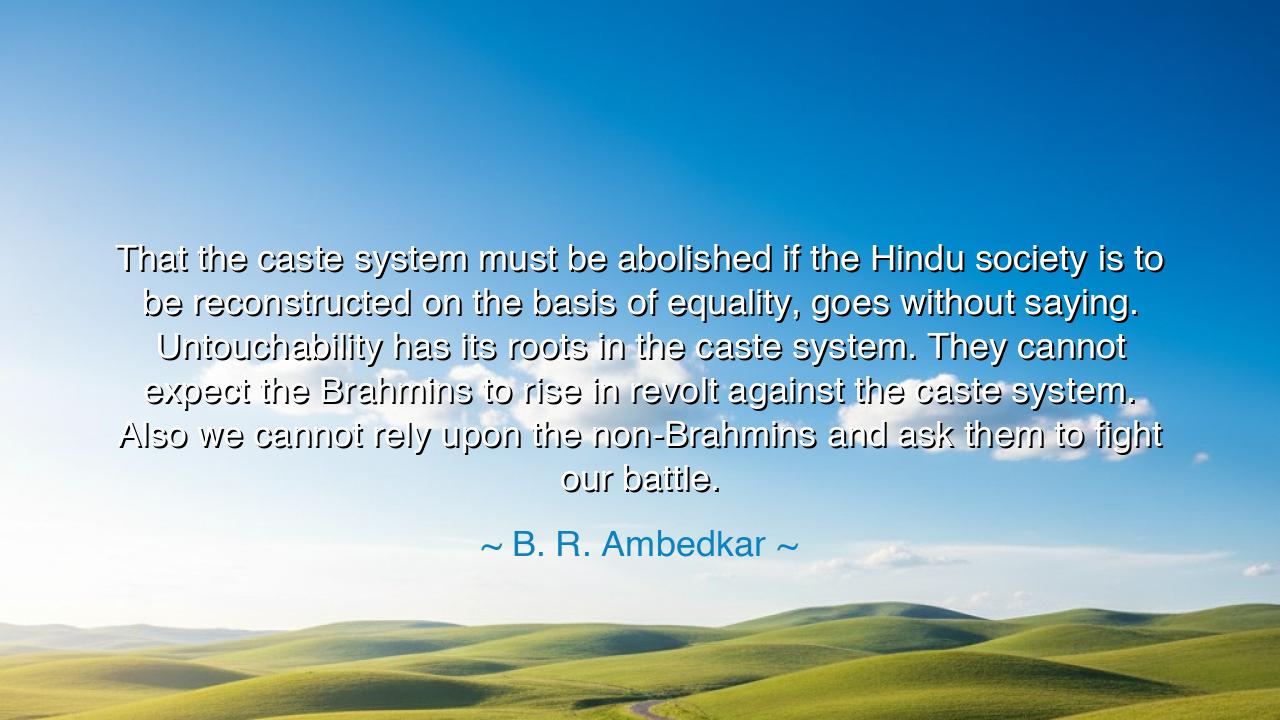
That the caste system must be abolished if the Hindu society is
That the caste system must be abolished if the Hindu society is to be reconstructed on the basis of equality, goes without saying. Untouchability has its roots in the caste system. They cannot expect the Brahmins to rise in revolt against the caste system. Also we cannot rely upon the non-Brahmins and ask them to fight our battle.






In the immortal words of B. R. Ambedkar, the great lawgiver of modern India and the tireless crusader for justice, we find a truth that burns like sacred fire: “That the caste system must be abolished if the Hindu society is to be reconstructed on the basis of equality, goes without saying. Untouchability has its roots in the caste system. They cannot expect the Brahmins to rise in revolt against the caste system. Also we cannot rely upon the non-Brahmins and ask them to fight our battle.” These are not mere words of anger or complaint—they are a declaration of awakening, a command to the oppressed to seize their own destiny. In this, Ambedkar speaks not only to the broken and the outcast of his time, but to every soul that has known injustice and yet waited for deliverance from others.
To grasp the meaning of this quote, one must first understand the poison Ambedkar sought to purge from the heart of India: the caste system, that ancient chain which bound man to birth and called it destiny. He saw that no nation can be free when its people are divided by sacred prejudice, when one soul is deemed pure and another impure by mere accident of birth. The abolition of caste, he taught, was not just a social reform—it was the resurrection of humanity itself. For as long as caste endures, equality remains a lie, and as long as equality is denied, freedom is a shadow without substance.
Ambedkar’s words were born of deep struggle, carved from the wounds of his own life. Born an “untouchable,” he was denied entry into temples, refused water from common wells, and humiliated in the schools where he sought knowledge. Yet he rose, like a flame that no oppression could extinguish, to become one of the greatest thinkers and leaders of his age. His vision was clear: to rebuild Hindu society not upon hierarchy, but upon justice—to replace the false divisions of caste with the eternal truth that all men and women are equal before conscience and before God. But he knew, too, that this transformation could not come from those who benefited from the old order.
When Ambedkar says, “They cannot expect the Brahmins to rise in revolt against the caste system,” he speaks with the realism of one who has studied power. Those who sit upon thrones do not topple them willingly. The privileged rarely destroy the systems that preserve their privilege. To expect the Brahmins—the guardians of ritual purity and the architects of hierarchy—to destroy caste, he knew, was to wait for the mountain to bow before the river. True liberation must come from within the oppressed themselves. The outcaste must refuse to be outcast; the slave must rise and break his own chains.
He also warns, “We cannot rely upon the non-Brahmins and ask them to fight our battle.” This is not a rejection of solidarity, but a lesson in self-reliance. Ambedkar understood that even among those lower in the social hierarchy, prejudice had taken root. The non-Brahmin, though oppressed by one group, often turned oppressor to another beneath him. Thus, he urged his people—the Dalits, the untouchables, the silenced—to awaken as one, to stop seeking saviors and become their own. He preached the gospel of self-respect, for no reform can endure if it depends on borrowed courage. True revolution must be born from within the hearts of those who have suffered most, for their strength, once awakened, cannot be conquered.
The origin of this insight lies deep in the philosophy of human dignity. Across ages and civilizations, those who have waited for deliverance from above have found only delay and disappointment. Whether in the fields of India, the plantations of America, or the prisons of apartheid South Africa, freedom has always come when the oppressed themselves have risen. Think of Frederick Douglass, who declared, “Power concedes nothing without a demand.” Think of Ambedkar himself, who led the great Mahad Satyagraha to claim the simple right for his people to drink water from a public tank. In that act, he struck at the heart of an empire older than British rule—the empire of caste.
The lesson that Ambedkar leaves for future generations is as clear as sunlight: justice is never given; it must be taken. Equality cannot be bestowed from above—it must be built from below. To those who suffer discrimination, he teaches the courage to organize, to educate, and to unite. To those who hold privilege, he offers not condemnation but invitation: to join in the work of humanity, to replace arrogance with empathy, and to see that freedom divided is freedom denied. For as long as one man is treated as less than human, none of us are fully human.
Therefore, let Ambedkar’s words echo as a sacred vow: “We must not wait for others to fight our battle.” Each person who dreams of equality must rise to defend it; each generation must rebuild justice anew. The caste system, in all its forms—whether by birth, race, class, or creed—must be shattered by the force of conscience and the light of truth. And when that day comes, when no one is called untouchable and no one is deemed superior, then shall humanity finally stand as it was meant to be—one people, many paths, but united in the dignity of all.






AAdministratorAdministrator
Welcome, honored guests. Please leave a comment, we will respond soon